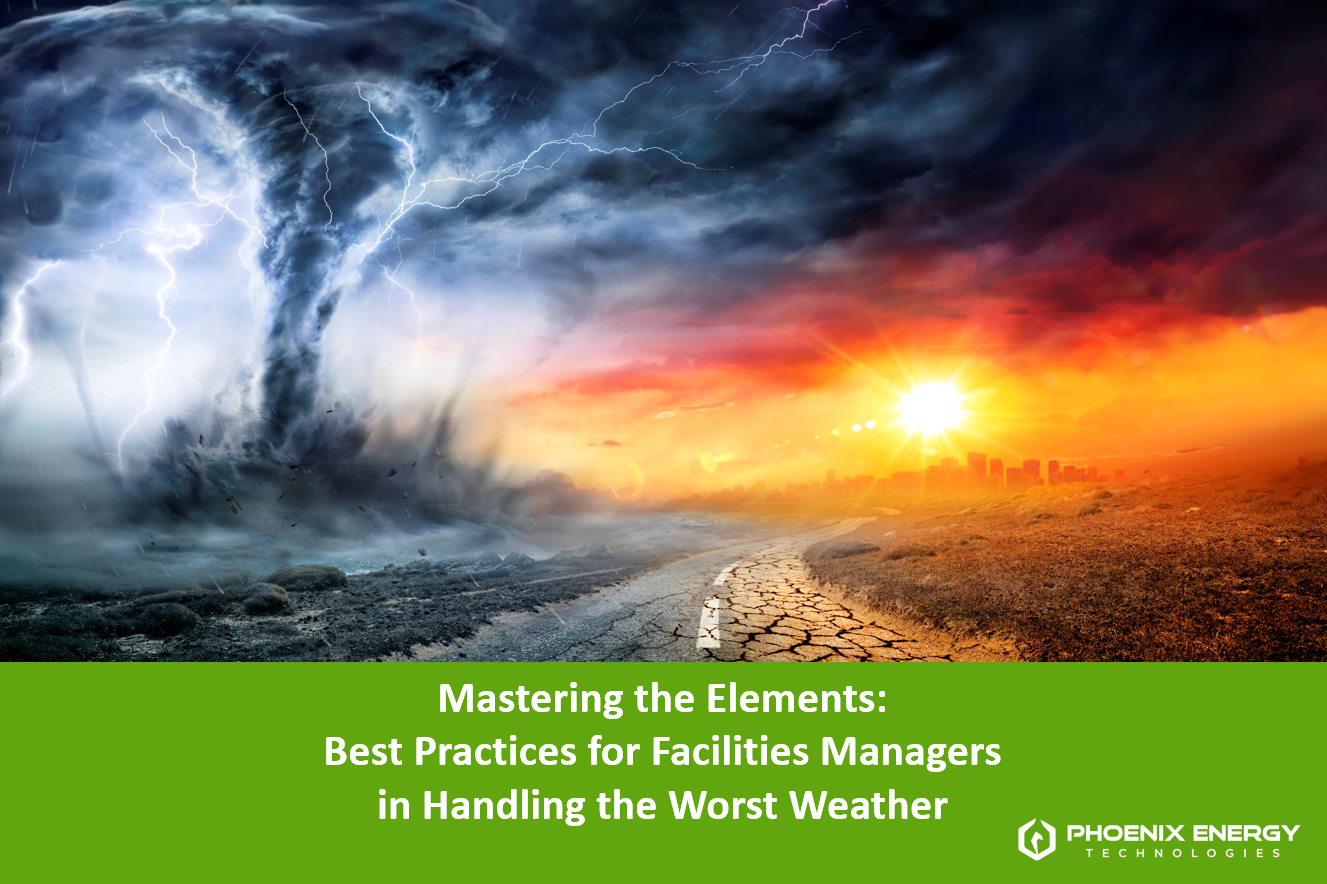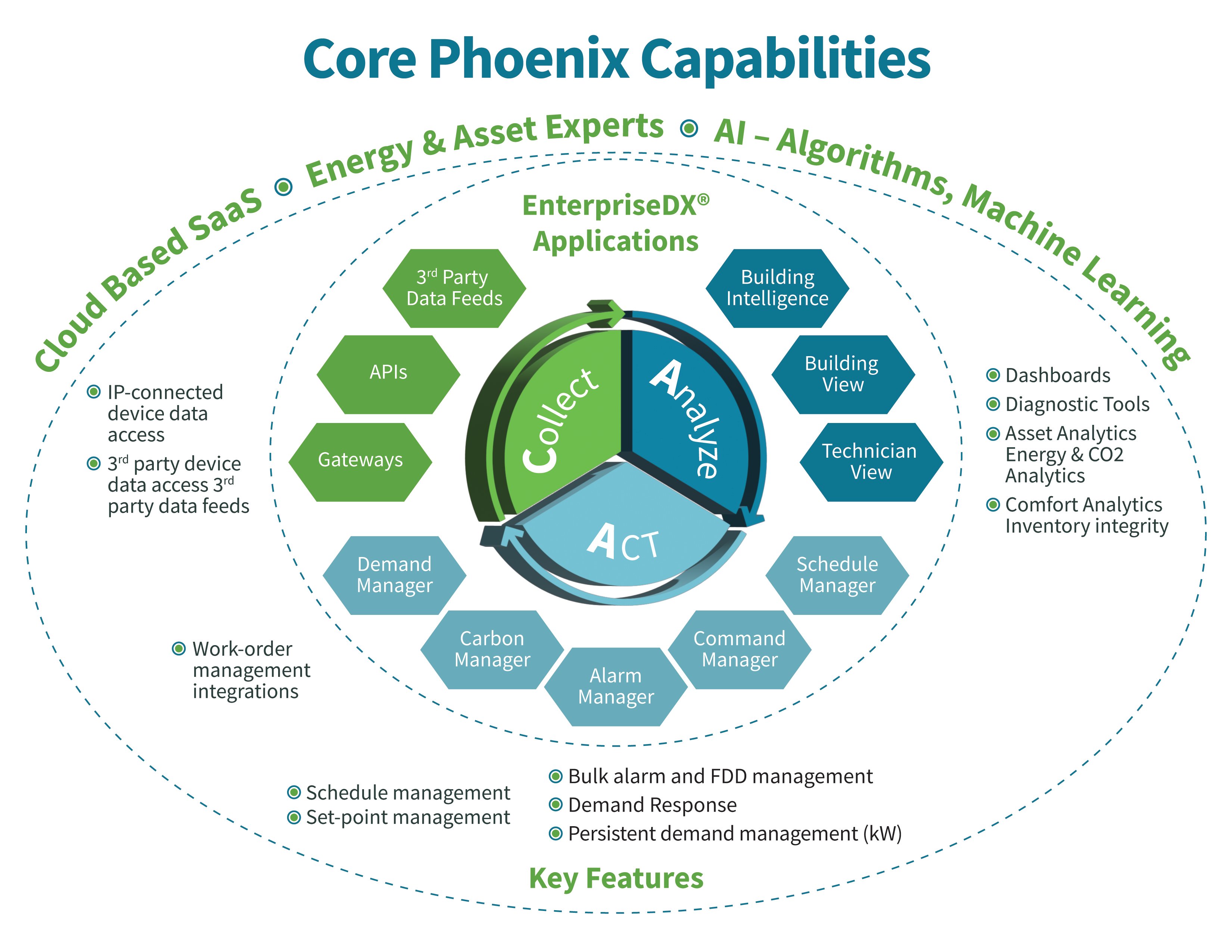Share this
Mastering the Elements: Best Practices for Facilities Managers in Handling the Worst Weather
by Michaela Quinzy on Aug 25, 2023

In the realm of facilities management, the weather is an unpredictable factor that can pose significant challenges. From scorching heatwaves to freezing blizzards, extreme weather conditions can disrupt operations, compromise safety, and impact occupant well-being. As a facilities manager, navigating these challenges requires a strategic approach that encompasses expertise, advanced tools, proactive maintenance, AI integration, and efficient processes. This article delves into best practices for facilities managers when handling the worst weather conditions, highlighting how a holistic approach can save time, money, and enhance both product safety and occupant comfort.
Swift Response and Skilled PersonnelWhen it comes to extreme weather events, time is of the essence. Having a responsive team in place, equipped with the necessary skills to adapt swiftly to changing conditions is paramount. Facilities managers must work alongside a team of experts who possess the ability to make informed decisions on short notice, effectively mitigating risks and ensuring that the facility continues to function smoothly.
Leveraging Cutting-Edge Tools and TechnologiesThe right tools and technology can significantly improve a facilities manager's ability to handle extreme weather scenarios. Utilizing weather forecasting tools, advanced HVAC systems, and real-time monitoring equipment allows for accurate predictions of weather patterns and prompt adaptation to changing conditions. This approach empowers facilities managers to take preventive actions and effectively manage challenges as they arise.
A Focus on Proactive Maintenance and Predictive AnalyticsInstead of merely responding to issues as they surface, facilities managers should prioritize proactive maintenance. This involves regular inspections and maintenance checks to identify vulnerabilities before they escalate. By harnessing predictive analytics, historical data, and equipment performance metrics, facilities managers can anticipate maintenance needs and prevent unexpected disruptions during severe weather events.
Streamlined Alarm and Notification SystemsAutomated alarm systems play a pivotal role in managing weather-related challenges. These systems can send out automated notifications to alert the team about critical changes in facility conditions, such as sudden temperature fluctuations, power outages, or flooding. Integration of such alarm systems with a centralized monitoring platform ensures that the team is well-informed and ready to respond promptly.
The Potential of Artificial Intelligence (AI)The integration of Artificial Intelligence (AI) has revolutionized facilities management. AI algorithms analyze data from diverse sources such as weather forecasts, equipment sensors, and occupancy patterns to make informed predictions and recommendations. Facilities managers can harness AI to optimize energy consumption, adjust climate controls based on occupancy, and preemptively identify potential challenges arising from extreme weather conditions. This not only improves energy efficiency but also guarantees occupant comfort and safety.
Embracing Cost-Efficiency through Proactive MeasuresThe financial advantages of proactive weather management cannot be overlooked. By investing in regular maintenance, predictive analytics, and automation, facilities managers can prevent expensive equipment breakdowns and the subsequent repair or replacement costs. Additionally, proactive measures minimize downtime during severe weather events, contributing to enhanced operational efficiency and substantial long-term savings.
Uninterrupted Operations and Time ManagementTimely responses are crucial when extreme weather strikes. The ability to promptly address challenges and implement solutions is vital for maintaining uninterrupted operations. Facilities managers can achieve this through a combination of expert personnel, advanced tools, and efficient processes. Such rapid responses minimize disruptions and allow facilities to continue functioning seamlessly even in the face of adverse weather conditions.
Prioritizing Product Safety and Occupant ComfortFacilities managers are entrusted with ensuring the safety of stored products and the well-being of facility occupants, irrespective of weather conditions. Extreme weather can jeopardize both. By implementing measures like temperature and humidity control, weather-resistant building materials, and robust backup power systems, facilities managers create an environment that safeguards products and guarantees occupant comfort, even during the harshest weather scenarios.
Phoenix Energy Technologies has been providing smart building IoT analytics solutions, leveraging our proprietary CAA closed loop framework (collect-analyze-act) to customers for more than 15 years. Phoenix Energy Technologies pairs industry expertise with solutions that are uniquely capable of integrating new and existing systems to create a seamless web-based platform that drive cost efficiencies and improve comfort. Our EnterpriseDX® IoT data platform generates ROI for customers by optimizing equipment efficiency that reduces energy costs, decreases repair and maintenance spend, and lowers capex by extending the life of assets.
The addition of AI allows us to augment our existing core closed-loop capabilities to be better, faster, more dynamic, and advance towards an autonomous and adaptive closed-loop system.
In the realm of facilities management, weather-related challenges are inescapable. However, by emphasizing swift responses, skilled personnel, advanced tools, proactive maintenance, AI integration, and efficient processes, facilities managers can navigate these challenges adeptly. By adopting best practices that prioritize proactive measures, facilities managers not only achieve financial savings and time efficiency but also enhance product safety and occupant comfort. Embracing these practices equips facilities managers to confidently tackle extreme weather conditions and ensure the continued success of their facilities, regardless of the forecast.
Share this
- Facilities Management (91)
- Energy Management (69)
- Company News (49)
- Smart Buildings (37)
- Retail (36)
- Building Management (24)
- Building Automation Systems (21)
- Sustainability (20)
- Energy Demand Management (19)
- EEI (15)
- Adaptive Energy Management (14)
- Grocery (14)
- demand response (14)
- Artificial Intelligence (12)
- Data Integration and Visibility (10)
- HVAC IQ (10)
- COVID-19 (8)
- Customer Spotlight (8)
- Carbon Management (7)
- Refrigeration Optimization (7)
- Setpoints and Temperatures (7)
- Equipment Maintenance (6)
- Operational Efficiency (6)
- Ask Ron (5)
- Asset Manager (5)
- Finance and Procurement (5)
- IoT and Digital Transformation (5)
- Awards (4)
- Comfort (4)
- Energy & Store Development (4)
- Safety and Compliance (4)
- Demand Charge Management (3)
- Energy Management System (3)
- Lifecycle Asset Management (3)
- Premium Services (3)
- Refrigeration IQ (3)
- Automated Demand Response (2)
- ConnexFM (2)
- Customer Service (2)
- HVAC Vendor Management (2)
- Load Shedding (2)
- Technician View (2)
- AIM Act (1)
- ALD (1)
- Analytics (1)
- Commissioning (1)
- Data (1)
- Data Integration and Visualization (1)
- EMS (1)
- Knowledge Center (1)
- OSHA (1)
- asset management (1)
- January 2026 (1)
- December 2025 (1)
- November 2025 (1)
- October 2025 (2)
- September 2025 (1)
- August 2025 (3)
- July 2025 (1)
- June 2025 (1)
- May 2025 (2)
- March 2025 (2)
- February 2025 (1)
- January 2025 (2)
- December 2024 (2)
- October 2024 (1)
- September 2024 (1)
- August 2024 (2)
- June 2024 (2)
- April 2024 (2)
- March 2024 (2)
- January 2024 (1)
- December 2023 (1)
- October 2023 (2)
- September 2023 (2)
- August 2023 (2)
- July 2023 (1)
- May 2023 (2)
- April 2023 (2)
- March 2023 (3)
- February 2023 (1)
- January 2023 (1)
- December 2022 (1)
- November 2022 (2)
- October 2022 (2)
- September 2022 (1)
- May 2022 (2)
- April 2022 (1)
- March 2022 (3)
- February 2022 (2)
- January 2022 (4)
- December 2021 (2)
- November 2021 (3)
- October 2021 (1)
- September 2021 (3)
- August 2021 (4)
- July 2021 (1)
- June 2021 (2)
- May 2021 (1)
- January 2021 (2)
- December 2020 (2)
- November 2020 (2)
- October 2020 (3)
- September 2020 (4)
- August 2020 (3)
- July 2020 (2)
- June 2020 (3)
- May 2020 (3)
- April 2020 (5)
- March 2020 (5)
- February 2020 (4)
- January 2020 (4)
- December 2019 (4)
- November 2019 (3)
- October 2019 (4)
- September 2019 (5)
- August 2019 (4)
- July 2019 (4)
- May 2019 (2)
- April 2019 (3)
- February 2019 (1)
- December 2018 (1)
- November 2018 (1)
- October 2018 (3)
- September 2018 (3)
- August 2018 (3)
- July 2018 (3)
- June 2018 (3)
- May 2018 (1)
- June 2015 (1)
- March 2013 (1)
- January 2013 (1)
- December 2011 (1)
- October 2011 (1)
- September 2011 (1)


